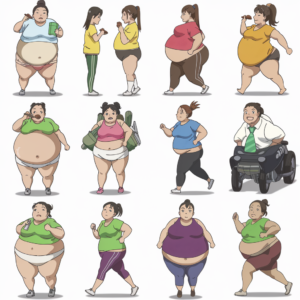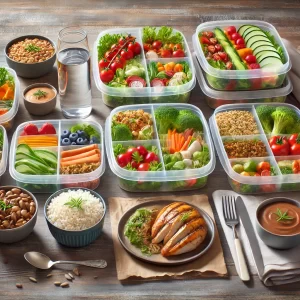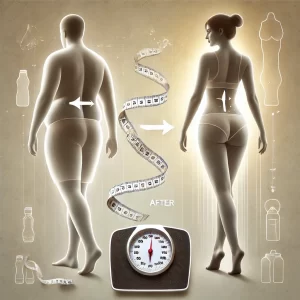The Essential Do’s and Don’ts of the Raw Food Diet for Weight Loss
Introduction
The Raw Food Diet is a plant-based eating plan that emphasizes consuming whole, uncooked foods in their natural state. While the diet can be highly effective for weight loss and overall health, following the right approach is key to maximizing its benefits. This list of  do’s and don’ts will guide you through the Raw Food Diet and help you achieve sustainable, long-term weight loss.
do’s and don’ts will guide you through the Raw Food Diet and help you achieve sustainable, long-term weight loss.
Do’s of the Raw Food Diet
1. Do Focus on Fresh, Whole Foods
The foundation of the Raw Food Diet is fresh, whole, uncooked foods, such as fruits, vegetables, nuts, seeds, and sprouted grains. Make sure to include a variety of colorful fruits and vegetables in your meals to ensure you’re getting all the necessary vitamins, minerals, and antioxidants. These foods provide the essential nutrients your body needs for weight loss and overall health.
Incorporating fresh, whole foods into your diet will help reduce your calorie intake while providing the nutrients needed to support sustainable weight loss.
2. Do Prioritize Hydrating Foods
Many raw foods, such as fruits and vegetables, are naturally hydrating and can help keep you full and satisfied while supporting weight loss. Foods like watermelon, cucumber, lettuce, and citrus fruits are high in water content and low in calories, making them excellent choices for hydration and satiety.
Eating hydrating foods will not only help you stay full but will also support healthy digestion and reduce bloating.
3. Do Include Healthy Fats in Your Meals
While the Raw Food Diet is primarily plant-based, it’s important to include sources of healthy fats to provide essential fatty acids and promote satiety. Foods like avocados, nuts, seeds, and cold-pressed oils (such as olive oil and coconut oil) are excellent choices that provide healthy fats without compromising the raw nature of the diet.
Including healthy fats in your meals will help keep you full and provide the nutrients necessary for maintaining healthy skin, hair, and overall well-being.
4. Do Focus on Variety
Eating a variety of raw foods is essential for getting all the nutrients your body needs. Be sure to include a mix of fruits, vegetables, nuts, seeds, and sprouted grains in your diet to ensure you’re getting a balanced intake of vitamins, minerals, and healthy fats. This variety will also keep your meals interesting and prevent dietary boredom.
Rotating different types of fruits, vegetables, and healthy fats will help ensure you get all the essential nutrients your body needs for optimal health and weight loss.
5. Do Stay Hydrated
Drinking enough water is essential for overall health and weight loss, especially on the Raw Food Diet. Proper hydration supports digestion, helps flush out toxins, and  can even reduce feelings of hunger. Aim for at least 8 glasses of water per day, and consider drinking herbal teas or adding lemon to your water for extra flavor.
can even reduce feelings of hunger. Aim for at least 8 glasses of water per day, and consider drinking herbal teas or adding lemon to your water for extra flavor.
Staying hydrated will support your digestion and help keep you full, reducing the likelihood of overeating.
Don’ts of the Raw Food Diet
1. Don’t Overeat High-Fat Raw Foods
While raw nuts, seeds, and oils are healthy sources of fat, they are also calorie-dense, which can lead to overeating if you’re not mindful of portion sizes. It’s important to practice moderation when consuming high-fat raw foods, especially if your goal is weight loss. Use portion control when adding nuts, seeds, or oils to your meals.
Focusing on portion sizes will help prevent excess calorie consumption and ensure you stay on track with your weight loss goals.
2. Don’t Skip Protein
Protein is an important macronutrient for weight loss and muscle maintenance, even on a raw food diet. Make sure to include plant-based sources of protein, such as raw nuts, seeds, sprouted grains, and legumes, in your meals. These foods will help keep you full and support muscle maintenance while promoting fat burning.
Including adequate protein in your diet will help ensure you’re getting the nutrients necessary for healthy weight loss and overall well-being.
3. Don’t Neglect Meal Planning
Meal planning is essential for success on the Raw Food Diet, especially if you’re new to the diet. Plan your meals and snacks for the week in advance, focusing on a variety of fruits, vegetables, nuts, and seeds. Having a plan will make it easier to stick to the diet and avoid reaching for non-compliant, processed foods when you’re busy or hungry.
Preparing meals in advance and keeping healthy snacks on hand will  help you stay on track and achieve your weight loss goals.
help you stay on track and achieve your weight loss goals.
4. Don’t Rely on Processed Raw Foods
While there are many “raw” food products available on the market, such as raw energy bars, crackers, and desserts, it’s important to focus on whole, unprocessed foods for the best results. Processed raw foods may still contain added sugars, fats, and calories that can hinder your weight loss progress.
Stick to fresh, whole fruits, vegetables, nuts, and seeds to get the most nutritional benefits and support your weight loss goals.
5. Don’t Be Too Restrictive
While the Raw Food Diet can be effective for weight loss, it’s important not to be too restrictive or rigid in your approach. If you find the diet too difficult to follow or feel deprived, consider incorporating some lightly cooked or steamed vegetables into your meals. The goal is to create a sustainable, balanced diet that works for you in the long term.
Allowing for flexibility will make the diet more enjoyable and easier to maintain over time.
Conclusion
The Raw Food Diet is a highly effective, plant-based approach to weight loss that emphasizes whole, uncooked foods in their natural state. By following these essential do’s and don’ts, you can maximize your success on the Raw Food Diet and achieve your weight loss goals while maintaining a balanced, nutritious eating plan.
Focus on fresh, whole foods, include healthy fats in your meals, and stay hydrated to ensure long-term success on your raw food journey.